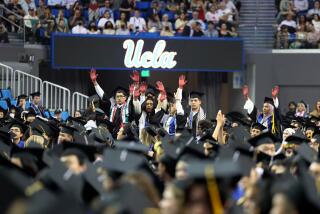ORANGE : King Speech Sparks New Dedication
- Share via
Martin Luther King Jr. envisioned a day when freedom would ring from the prodigious hilltops of New Hampshire to the snowcapped Rockies of Colorado to the curvaceous slopes of California.
And on a grassy field in front of Chapman University’s Memorial Hall, students and teachers gathered Thursday to honor King’s vision of liberty for America, immortalized in his “I Have a Dream” speech, delivered during a massive civil rights march on Washington in August, 1963.
About 50 people re-enacted the historic march Thursday afternoon, walking through the heart of the small university in Orange. The re-enactment is one of a host of activities staged in recognition of Black History Month at the campus.
Teachers and students spoke briefly about civil rights and race relations before quietly listening to a recording of King’s speech in the midday sun.
“Jim Crow was a horror on this land,” said Robert Slayton, a history professor at Chapman University. “And this movement beat it.”
Slayton urged the audience to seize the moral high ground--as King did--in championing civil rights. “If I have one dream,” he said, “it is that God grant us the genius, self-sacrifice and subtlety of our predecessors.”
Orange High School teacher John Johnson hoped the re-enactment would encourage the 18 students he brought along to learn more about the civil rights movement.
“It’s a little history lesson for the kids,” said Johnson, who was active in Chapman’s Black Student Union when he attended the university more than a decade ago. “It’s important not only to African Americans but to all Americans. Civil rights is a concern for everybody.”
Jesse Rivers, head of the university’s Black Student Union, hoped that black students would heed King’s message of unity and that white students would strive to judge people not by color but by “the content of their character.”
A former Marine now majoring in history, Rivers, 28, said he believes civil rights has certainly advanced since King’s speech, but that the movement “still has a long way to go.”
“We are the beneficiaries of that movement,” Rivers said. “And let us never forget that, because that would be a grave injustice.”
More to Read
Sign up for Essential California
The most important California stories and recommendations in your inbox every morning.
You may occasionally receive promotional content from the Los Angeles Times.










